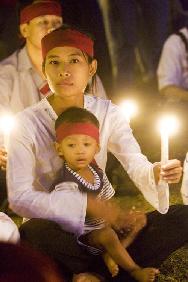LONDON — Thousands of demonstrators in cities across the world joined Saturday in protests against the military junta in Myanmar after the regime acknowledged detaining hundreds of Buddhist monks who had led huge protests.
While sympathizers from typhoon-wracked Taipei to London chanted and waved placards, activists in Myanmar slipped quietly underground to hold candlelight prayer vigils for those killed and arrested in the junta's brutal suppression of their uprising.
Hoping to send Myanmar's generals a message that "the world is still watching," the human rights group Amnesty International organized marches in more than two dozen Asian, European and North American cities.
Some observers said these would probably have minimal effect on an inward-looking military elite which has largely ignored world opinion and pressure during its 45 years in power.
There were no visible demonstrations in Myanmar's largest city of Yangon, where bans on gatherings have been enforced by gun-toting soldiers, but some in the city and elsewhere in the country prayed in their homes at the suggestion of a Buddhist monk interviewed by Radio Free Asia's Myanmar-language service.
The military has acknowledged detaining hundreds of monks, who spearheaded the mass demonstrations. The party of imprisoned pro-democracy leader Aung San Suu Kyi said Saturday that 210 of its members had been arrested during the crackdown.
Before demonstrations began in London, British Prime Minister Gordon Brown called for new European Union sanctions against the junta, including a ban on future investment in the country, also known as Burma.
"The anger of the world has been expressed about the outrages that have taken place against the people of Burma," Mr. Brown said during a televised meeting with Buddhist monks gathered in his 10 Downing St. office.
Myanmar monks scattered flower petals in London's River Thames and led about 3,000 people — some chanting "Burma, Burma, Free, Free" — to a rally in Trafalgar Square.
"Burma is not a human rights emergency of today, last week or last month," said Amnesty International's chief, Irene Khan. "It is a human rights emergency that the world has chosen to forget for the last 20 years. We will not forget this time round, we will not let the people of Burma down."
The international day of protest began in Melbourne, Australia, where 200 people marched behind a banner demanding "No More Bloodshed." In Sydney, some 200 marchers dressed in colourful clothes to show their support for what some are calling the "Saffron Revolution" after the Myanmar monks' robes.
In Brussels, about 700 people brought yellow roses as a symbol peaceful protest and carried banners and pictures of Ms. Suu Kyi. In Paris a few hundred demonstrators, one holding a placard reading "Boycott the 2008 Olympics," gathered near the Chinese Embassy to urge Beijing to use its influence to stop the crackdown.
Police cordoned off part of Paris' posh Avenue George V, forcing protesters to stand in front of an adjacent embassy.
Centrist politician Francois Bayrou, who took part in the protest, told AP Television News that refusal to participate in the Beijing Olympic Games should be dangled to get China to end its support for the Myanmar regime. "We have to show those responsible ... that we are ready to go far," he said.
About 200 people dressed in the red colour that pro-democracy activists in Myanmar have adopted took part in a silent demonstration in one the main squares of Stockholm, Sweden's capital.
In Taipei, hundreds braved a strong typhoon to demand action from the international community. Smaller crowds turned out in Bangkok and Manila. In Malaysia's biggest city, Kuala Lumpur, 300 people attended a candlelight vigil Friday evening.
An emotional protest was held in Vancouver. Speakers recounted what drew them to stand in the sprinkling grey rain to advocate that Canada play a greater role in pressuring the military regime in the Asian country.
In Halifax, protesters lit candles and burned incense as they chanted for peace.
And in Montreal, protesters marched in the rain, holding banners and waving placards calling for freedom for Myanmar's monks.
The rallies were sprinkled with celebrities. Actor Jim Carrey held a New York news conference to call for United Nations Security Council action, while singer Damien Rice in London planned to perform a tribute to Ms. Suu Kyi.
International condemnation of Myanmar's junta intensified at the UN, with the U.S. warning it would push for UN sanctions against Myanmar if it fails to respond to the world's demands for democratic reforms.
But the junta has shown little evidence that it is taking world pressure to heart.
Myanmar's Foreign Minister Nyan Win told the UN General Assembly last week that democracy "cannot be imposed from outside" and demonstrators at recent pro-government rallies have carried placards saying "Oppose external interference."
"International public opinion is not enough. It hasn't been as effective as we had hoped. There is hope now that (opposition) is stirring inside the country. It must happen from inside the country, with pressure from outside," said Asda Jayanama, a former Thai diplomat who watches Myanmar.
The junta's treatment of the Buddhist monks — who are revered in the deeply religious country and led the street protests — is a key issue that could further inflame the people of Myanmar and anger soldiers loyal to the military rulers.
The government insisted that most of the monks it detained had already been freed, with only 109 still in custody, according to an official statement broadcast Friday night on state TV. The report said the junta was still hunting four monks it believed were ringleaders of the rallies.
Demonstrations that began in mid-August over a sharp fuel price increase swelled into Myanmar's largest anti-government protests in 19 years, inspired largely by thousands of monks who poured into the streets.
From The Globe and Mail



